
Smalltalk is a purely object oriented programming language (OOP) that was originally created in the 1970s for educational use, specifically for constructionist learning, but later found use in business. It was created at Xerox PARC by Learning Research Group (LRG) scientists, including Alan Kay, Dan Ingalls, Adele Goldberg, Ted Kaehler, Diana Merry, and Scott Wallace.
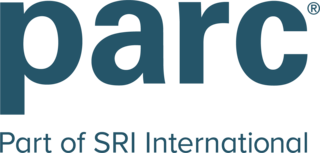
SRI Future Concepts Division is a research and development company in Palo Alto, California. It was founded in 1969 by Jacob E. "Jack" Goldman, chief scientist of Xerox Corporation, as a division of Xerox, tasked with creating computer technology-related products and hardware systems.
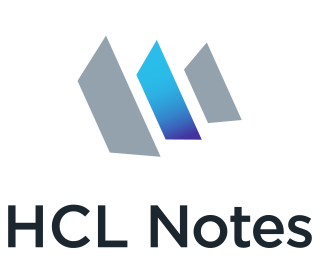
HCL Notes is a proprietary collaborative software platform for Unix (AIX), IBM i, Windows, Linux, and macOS, sold by HCLTech. The client application is called Notes while the server component is branded HCL Domino.
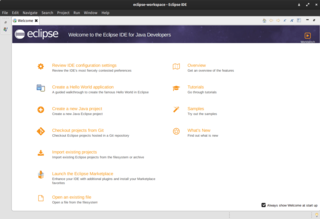
Eclipse is an integrated development environment (IDE) used in computer programming. It contains a base workspace and an extensible plug-in system for customizing the environment. It is the second-most-popular IDE for Java development, and, until 2016, was the most popular. Eclipse is written mostly in Java and its primary use is for developing Java applications, but it may also be used to develop applications in other programming languages via plug-ins, including Ada, ABAP, C, C++, C#, Clojure, COBOL, D, Erlang, Fortran, Groovy, Haskell, HLASM, JavaScript, Julia, Lasso, Lua, NATURAL, Perl, PHP, PL/I, Prolog, Python, R, Rexx, Ruby, Rust, Scala, and Scheme. It can also be used to develop documents with LaTeX and packages for the software Mathematica. Development environments include the Eclipse Java development tools (JDT) for Java and Scala, Eclipse CDT for C/C++, and Eclipse PDT for PHP, among others.

The Standard Widget Toolkit (SWT) is a graphical widget toolkit for use with the Java platform. It was originally developed by Stephen Northover at IBM and is now maintained by the Eclipse Foundation in tandem with the Eclipse IDE. It is an alternative to the Abstract Window Toolkit (AWT) and Swing Java graphical user interface (GUI) toolkits provided by Sun Microsystems as part of the Java Platform, Standard Edition (J2SE).
VisualAge is a family of computer integrated development environments from IBM, which supports multiple programming languages. VisualAge was first released in October 1993. It was discontinued on April 30, 2007, and its web page was removed in September 2011. VisualAge was also marketed as VisualAge Smalltalk, and in 2005, Instantiations, Inc. acquired the worldwide rights to this product. IBM has stated that XL C/C++ is the followup product to VisualAge.
EGL, originally developed by IBM and now available as the EDT open source project under the Eclipse Public License (EPL), is a programming technology designed to meet the challenges of modern, multi-platform application development by providing a common language and programming model across languages, frameworks, and runtime platforms.

Kaleida Labs, Inc., formed in 1991 to produce the multimedia cross-platform Kaleida Media Player and the object oriented scripting language ScriptX that was used to program its behavior. The system was aimed at the production of interactive CD ROM titles, an area of major effort in the early 1990s. When the system was delivered in 1994, it had relatively high system requirements and memory footprint, and lacked a native PowerPC version on the Mac platform. Around the same time, rapid changes in the market, especially the expansion of the World Wide Web and the Java programming language, pushed the interactive CD market into a niche role. The Kaleida platform failed to gain significant traction and the company was closed in 1996.
Extreme Blue is one of IBM's internship program for both graduate and undergraduate students; it also serves as a placement opportunity for future IBM employment due to the significant effort put into placement of the interns.

A class browser is a feature of an integrated development environment (IDE) that allows the programmer to browse, navigate, or visualize the structure of object-oriented programming code.
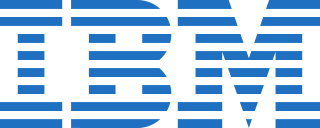
IBM is a globally integrated enterprise operating in 170 countries. IBM's R&D history in Israel began in 1972 when Professor Josef Raviv established the IBM Israel Scientific Center in the Technion's Computer Science Building in Haifa. As of 2023, over 3000 individuals work at IBM R&D locations across Israel, including Haifa, Tel Aviv, Herzliya, Rehovot, and the Jerusalem Technology Park.
David A. Thomas, sometimes known as "Big" Dave Thomas is a software developer, researcher and entrepreneur. He was founder and CEO of Object Technology International, which created the products that became IBM VisualAge and eventually Eclipse.

Seaside, an acronym that stands for “Squeak Enterprise Aubergines Server with Integrated Development Environment,” is computer software, a web framework to develop web applications in the programming language Smalltalk. It is distributed as free and open-source software under an MIT License.
GemStone/S is computer software, an application framework that was first available for the programming language Smalltalk as an object database. It is proprietary commercial software.
Eclipse OpenJ9 is a high performance, scalable, Java virtual machine (JVM) implementation that is fully compliant with the Java Virtual Machine Specification.

Protecode was a private company based in Ottawa, Ontario, Canada that provided open source license and security management software used for software development license compliance.
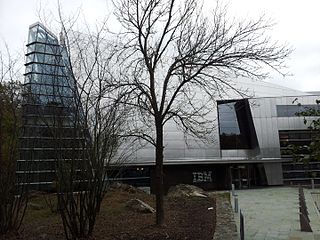
International Business Machines Corporation, nicknamed Big Blue, is an American multinational technology company headquartered in Armonk, New York and present in over 175 countries. IBM is the largest industrial research organization in the world, with 19 research facilities across a dozen countries, having held the record for most annual U.S. patents generated by a business for 29 consecutive years from 1993 to 2021.
Oracle TopLink is a mapping and persistence framework for Java developers. TopLink is produced by Oracle and is a part of Oracle's OracleAS, WebLogic, and OC4J servers. It is an object-persistence and object-transformation framework. TopLink provides development tools and run-time functionalities that ease the development process and help increase functionality. Persistent object-oriented data is stored in relational databases which helps build high-performance applications. Storing data in either XML or relational databases is made possible by transforming it from object-oriented data.









